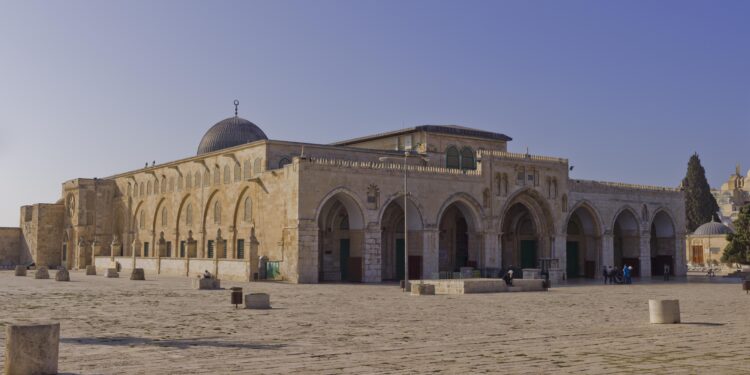Al-Aqsa Mosque, one of Islam’s holiest sites and a flashpoint in the Israeli-Palestinian conflict, has once again become the center of escalating tensions. Recent developments reveal a sharp increase in Israeli actions that many Palestinians and international observers describe as violations of the site’s sanctity and rights. As the situation intensifies, this article examines the latest reports and allegations, highlighting the perspectives of Palestinians who say their warnings about these violations have been consistently validated.
Al-Aqsa Mosque Under Siege Israeli Actions Escalate Tensions in East Jerusalem
Recent developments in East Jerusalem have once again underscored the precarious situation surrounding the Al-Aqsa Mosque compound. Israeli security measures, including the installation of new checkpoints and increased military presence around the holy site, have inflamed tensions within the Palestinian community. These actions coincide with a series of restrictions on worshippers’ access and the contentious removal of Palestinian flags, emblematic of a broader strategy perceived as an attempt to assert control over a site of profound religious and cultural significance.
The escalating confrontations have also led to a rise in clashes between Israeli forces and Palestinian residents, contributing to a volatile atmosphere marked by protests and condemnations from international human rights organizations. Key concerns include:
- Disruption of religious practices – worshippers face limited access during peak prayer times.
- Increased military operations in residential neighborhoods surrounding the mosque.
- Arrests and detentions of young Palestinians participating in demonstrations.
- Damage to holy sites reported in recent exchanges of violence.
| Aspect | Impact | Current Status |
|---|---|---|
| Access Restrictions | Reduced worshipper attendance | Ongoing |
| Military Presence | Heightened tensions in surrounding areas | Escalating |
| Protests | Frequent clashes and arrests | Intensifying |
| International Response | Calls for de-escalation | Growing |
Historical Significance and Recent Violations Contextualizing the Palestinian Claims
For centuries, the Al-Aqsa Mosque has stood as a cornerstone of Palestinian heritage and religious identity, deeply woven into the fabric of their historical narrative. Revered not only as the third holiest site in Islam but also as a symbol of enduring Palestinian connection to Jerusalem, its significance transcends spiritual realms to embody a collective memory of resilience. Archaeological findings and historical accounts reaffirm the longstanding presence of Palestinian communities safeguarding this sacred site against numerous geopolitical upheavals, underscoring their legitimate claims upheld by centuries of continuous worship and custodianship.
Recent incidents of intensified Israeli encroachments have reignited tensions, with documented actions ranging from unauthorized visits by right-wing extremist groups to restrictions on Palestinian worshippers. These violations disrupt the fragile status quo and challenge international norms concerning religious freedom and heritage preservation. Among the recurring infringements:
- Increased military presence around the mosque compound, limiting access during key religious occasions.
- Installation of surveillance equipment affecting worshipper privacy and sanctity.
- Physical altercations resulting in injuries to Palestinian custodians and worshippers.
| Violation Type | Reported Instances (2023) | Impact |
|---|---|---|
| Unauthorized Entry | 45 | Heightened tensions; restricted worship |
| Military Raids | 30 | Physical damage; arrests |
| Surveillance Installations | 15 | Privacy infringement; increased intimidation |
Calls for International Intervention Protecting Religious Sites and Upholding Human Rights
Global voices are intensifying their demands for urgent international action to safeguard the sanctity of religious sites in Jerusalem, particularly as tensions escalate around the Al-Aqsa Mosque compound. Governments, humanitarian organizations, and human rights advocates are calling on the United Nations and other international bodies to enforce protections that respect both the historical significance and the fundamental rights of worshippers. Amid reports of increased incursions and structural damages inflicted by Israeli security measures, there is growing consensus that unilateral actions risk destabilizing the fragile status quo and fueling further conflict.
Calls for intervention emphasize the necessity of upholding basic human rights principles and international law without partiality. Key demands from these appeals include:
- Immediate cessation of aggressive incursions and demolition activities around holy sites.
- Independent monitoring by international observers to ensure accountability and transparency.
- Engagement in dialogue involving Palestinian representatives, Israeli authorities, and global peace mediators.
- Protection of freedom of worship for communities affected by restricted access and security operations.
| Intervention Priority | Goal |
|---|---|
| Preservation | Maintain historical and religious integrity |
| Human Rights | Safeguard worshippers and civilians |
| Monitoring | Independent, real-time incident reporting |
| Diplomacy | Facilitate inclusive conflict resolution |
Concluding Remarks
As tensions continue to escalate around Al-Aqsa Mosque, the latest reports of Israeli actions have once again underscored the deepening grievances expressed by Palestinians. With international calls for restraint largely unheeded, the situation remains a potent flashpoint in an already volatile region. Observers and stakeholders alike will be watching closely to see whether diplomatic efforts can stem further violations and pave the way for a sustainable resolution to this enduring conflict.














